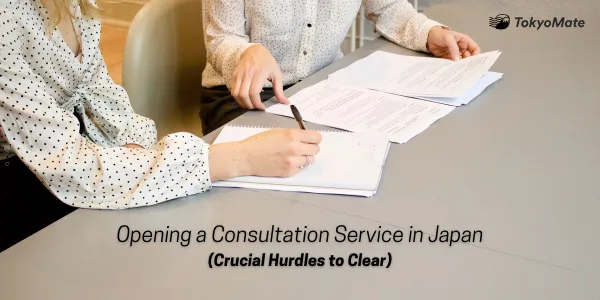How to Open a Consultation Service in Japan: 2 Crucial Hurdles to Clear

Thinking of opening a consultation service in Tokyo? The good news is there are no requirements outside of the regular procedures for opening a business in Japan. However, how successful your business will be will depend on some key factors.
In Japan, anyone can be a consultant. The bar for entry is relatively low, with no special licensing prerequisites. Since a consulting service typically has no inventory, your profit margin will be high—that is, once you've secured your first contract. And there lies one of the crucial hurdles to clear.
Consulting firms have reportedly found Japan's consultation market tough to crack. A traditional style of doing business hampers the hiring of outside help in the form of consultants. The difficulty in proving tangible benefits from a mostly intangible service is also another issue. However, as Source Global Research points out, "Japanese clients' aversion to services that don't provide tangible results seems to dovetail perfectly with the growing trend of digital asset-based services, as these can apply advanced analytics to provide quantifiable insights."
In other words, prove your worth in the form of data and Japanese companies will be more willing to consider your services. What else should you be thinking about and preparing for? Below, we cover the two foremost issues.
1. Getting a consultant visa for Japan
Is there such a thing as a consultant visa for Japan? Not specifically. However, if your consultancy work is within engineering or the humanities field, you can apply for an "Engineer/Specialist in Humanities" visa. Consultant career fields within this visa type include the following:
Software or systems engineers
Computer or game programmers
Economic or financial analyst
Human resources advisor
Public Relations or marketing advisor
Fashion or interior design consultant
Product development consultant
Important to note: A fundamental requirement of the Engineer/Specialist in Humanities Visa is a contract with a company in Japan that will serve as your sponsor. June Advisors Group states, "You will need to prove that you have already signed stable contracts with different employers/clients in Japan that would generate enough income to support yourself (approximately 200,000 yen/month at the minimum).
This means that you first must obtain a contract with a company for the type of consultancy business you wish to open before obtaining this visa.
If you have yet to secure contracts for your consulting service, there are other visa options you can explore. One possibility is a Business Manager Visa, which would require you to incorporate a consultancy business in Japan. Check out the article, "The 3 Types of Visas You Need to Start Your Business in Japan," for more on the Business Manager Visa type.
2. Securing consultation contracts in Japan
Securing long-term contracts is the second milestone issue you will face when starting a consultation service in Tokyo. It is likely you will encounter challenges that Japanese consultants do not have to face. Namely, language hurdles, cultural differences, and steep competition from native consultants, who are well-versed in doing business here.
One avenue that will be unique to foreign consultants is marketing to the foreign community in Japan. In the years to come, foreign community growth is projected throughout Japan and will provide you with a larger audience if you wish to sell English-language only services.
International companies have long seen Hong Kong as the central financial hub in Asia. However, China's enforcement of the national security law in Hong Kong has raised concerns over its continued semi-autonomy. Corporations will likely be setting their eyes on other cities in Asia. To boost Japan's attractiveness for businesses wishing to migrate, sources close to the current administration state that Osaka and Fukuoka will be promoted as post-pandemic financial hubs, with the government allocating ¥50 million in their 2021 budget to that end.
Other marketing avenues that could lead to long-term contracts include providing free seminars and free consulting opportunities. Even if you have had past success in your home country or on the international scene, getting positive reviews in Japanese will be essential if you wish to grow your Japanese base. Free consulting sessions as you start out will allow businesses and individuals to try your services and will provide you with word-of-mouth reviews in return. Also, keep in mind that data and related analytics are key selling points when describing your service's benefits.
If you have lived in Japan for some time and are now making the switch to a consulting career, then cultural and language-related challenges will be less concerning for you. But for those who are new to Japan, we suggest hiring a local team who can provide you with bilingual business admin support, freeing you up to take care of the core of your consulting service.
In fact, hiring local virtual assistants could be the low-cost staffing solution you need to navigate the language barrier, enabling you to do business in Japan with less stress.
Further reading resources
The 3 Types of Visas You Need to Start Your Business in Japan, MailMate
Want to Enter Japan's Market with Your Business? A Quick Overview, MailMate
The 4 Month Business Manager Visa Japan, Explained, Tom Imura
Spending too long figuring out your Japanese mail?
Virtual mail + translation services start at 3800 per month. 30-day money-back guarantee.

